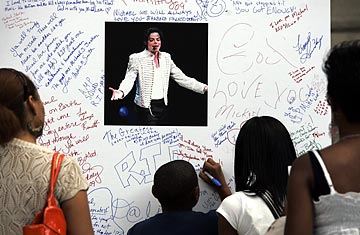
Michael Jackson fans sign a poster in his memory at the Museum for African History in Detroit on July 7
(2 of 2)
Lesser charges could be filed against doctors who may have overprescribed medication to Jackson or used aliases to do so, which seems to have been the practice of some medical professionals in the past. Documentation and photographs from a police raid of Jackson's Neverland Ranch after he was charged with child molestation show an array of drugs, some with the names of Jackson employees.
Attorney Brian Oxman, who helped represent Jackson during the molestation trial, says dozens of drug vials, including Zoloft, Percocet, Vicodin and Demerol, were found at the time. Oxman told TIME: "Instead of pursuing the evidence which was staring them right in the face really — overprescription by doctors, overprescription by employees who were providing him with their drugs — instead of pursuing that which was an obvious, easily proved case they went after the molestation."
Some of the drugs, like Demerol, Percocet and Vicodin, which Jackson may have continued to abuse, are covered by the Federal Controlled Substances Act — and their misuse can carry criminal penalties of up to 40 years in prison, says Rosenbluth. However, she cautions that sentencing is determined by many factors, such as the amount of the drug, whether the crime was a first offense and whether the administration of such drugs led to death. "Certainly the penalties are more severe if death occurred. Generally people who are first-time offenders though don't get anywhere near the statutory maximum," says Rosenbluth.
Doctors or other individuals who are alleged to have conspired to provide Jackson with drugs he shouldn't have had access to can also face felony conspiracy charges. "Even if someone is not a doctor, but [is] enabling Michael Jackson to get access to drugs knowing that he shouldn't have access to them, that person can be charged with some kind of criminal conspiracy," says Rosenbluth, citing the current case against Howard K. Stern and two physicians stemming from the death of Anna Nicole Smith. "Two of her doctors were charged, but Stern, who was not a doctor, was charged as well because he was alleged to have gotten prescriptions for her under his own name, knowing that they were for her, which is against the law. He was alleged to have conspired with these doctors to overprescribe pills for her." Stern was charged with conspiring to furnish Smith with drugs, the doctors with illegally prescribing drugs to Smith; all three were charged with "prescribing, administering or dispensing a controlled substance to an addict." The trio have pleaded not guilty. A preliminary hearing for their trial is set for Aug. 12.
As the Smith case shows, in California doctors can also face additional charges for prescribing drugs to a known addict, unless it's for a medicinal purpose. "There's all sorts of ways in which a doctor can get himself into trouble," says Rosenbluth. "Generally, I think what prosecutors would look at is, Did they know that this was a false name that Michael Jackson was using? Did they know that there was no need for this many prescriptions of a particular drug? Did they know that he was addicted to a prescription drug and didn't have a medical purpose for it? They will also look at how long the course of conduct went on. Were these doctors doing this with other patients as well as Michael Jackson? There's a whole host of things that will figure into any calculation as to whether someone is criminally liable."
Some of these charges are misdemeanors, which carry a potential sentence of up to a year, but each prescription can be a separate count, theoretically leading to consecutive sentences.
Why would doctors risk criminal charges to treat celebrities, who are notoriously skilled at getting whatever they want, no matter what the personal, financial or legal risk? Ego, says Dr. Drew Pinsky, a substance-abuse specialist who treats many celebrities. "You can imagine how gratifying it is for a doctor who can make somebody feel better — that's the reason you go into medicine," says Pinsky. "And then a really important person says, 'Oh, you've done such a good job. You've made me feel so good.' What that doctor may not understand is that what that patient needs is to get off the drugs, which doesn't make them feel good and they get very angry and dismiss the doctor. Because they have unlimited access and there's always someone available to give them what they want."
